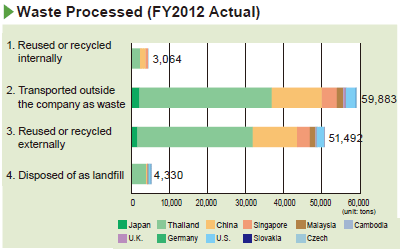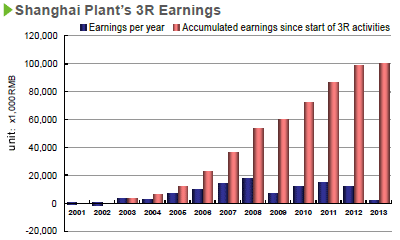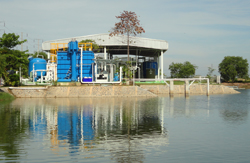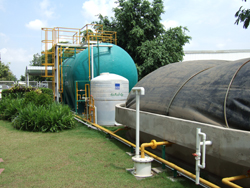Initiatives for Effective Use of Resources Back Number (2013)
Back to Latest Initiatives for Effective Use of Resources
Basic Approach
The Minebea Group recognizes that there are limits to the availability of resources used in its products, which include metals, plastics, and other raw materials, along with oil, natural gas, and other energy sources. Additionally, with regard to rare earth elements indispensable to the manufacture of electronics, since the number of countries producing and exporting the materials is limited, they are more susceptible to export restrictions.
We believe that the effective use of resources is critical to the continuation of our business activities, and to that end we are taking various management measures.
Results of FY2012 Initiatives
 In FY2012, principal raw materials used by Minebea Group included approximately 72,320 tons of steel and 5,400 tons of resin, with the total amount of materials used roughly on par with the previous fiscal year.
In FY2012, principal raw materials used by Minebea Group included approximately 72,320 tons of steel and 5,400 tons of resin, with the total amount of materials used roughly on par with the previous fiscal year.
The amount of landfill waste generated by the Group's operations in FY2012 totaled 4,330 tons. Though the FY2011 amount of landfill waste previously reported in the FY2011 report was 4,061 tons, as a result of an error in data collection methods, the actual amount was 4,697 tons. We apologize for the error. As a result, the amount of landfill waste in FY2012 declined by 367 tons compared to the previous year.
At our mass production plants in Thailand and China, we are recycling water inside the plants to the greatest extent possible and prevent external emissions through our "Plant Wastewater Zero System." Water emissions from Group plants in FY2012 totaled 784,000 m3, a decline of 132,000 m3 compared with FY2011.

Initiatives at Business Sites
Recycling Mobile Phones (Thailand)
From March 2012, Minebea Group subsidiaries in Thailand collaborated with Nokia to launch the "Weee Can Do Project" to collect and recycle discarded mobile phones and accessories. The project aimed at collecting a large number of discarded mobile phones and accessories within Minebea's plants in exchange for commemorative goods and presents from Nokia awarded by a lottery draw. At the Bang Pa-in and Lop Buri plants, the project was promoted through collection boxes at security gates, the cafeteria, stores and other areas, along with campaign stickers on employee buses.
The mobile phones and accessories collected were recycled by a Nokia subcontractor after removal of toxic materials. The number of mobile phones and accessories collected is as follows.
- Bang Pa-in Plant (campaign period: March 13, 2012—September 13, 2012)
Mobile phones: 2,169 units; Accessories: 1,424 items - Lop Buri Plant (campaign period: November 1, 2012—March 29, 2013)
Mobile phones: 1,106 units; Accessories: 1,379 items

Weee Can Do Project
Cumulative Profits from 3R Activities (China)
 Minebea Shanghai launched its 3R (Reduce, Reuse, Recycle) Committee in 2003 to spearhead efforts to effectively use and reduce the amount of industrial waste. Though at the beginning we paid contractors to dispose of and process most of the industrial waste, collection and separation initiatives have made it possible to sell some of the waste for a profit. From the start of the effort in 2003 through the end of FY2012, the total earnings from the waste sales have reached 100 million RMB (about ¥1.4 billion).
Minebea Shanghai launched its 3R (Reduce, Reuse, Recycle) Committee in 2003 to spearhead efforts to effectively use and reduce the amount of industrial waste. Though at the beginning we paid contractors to dispose of and process most of the industrial waste, collection and separation initiatives have made it possible to sell some of the waste for a profit. From the start of the effort in 2003 through the end of FY2012, the total earnings from the waste sales have reached 100 million RMB (about ¥1.4 billion).
Effective Use of Rain and River Water (Thailand)

Rainwater reservoir and rainwater reuse system at the Bang Pa-in Plant
The areas around the Bang Pa-in Plant, located near the capital of Bangkok, face a chronic shortage of tap water. The plant is striving to solve this community issue by lowering its tap water consumption through a rainwater reuse system which collects rainwater in a reservoir and purifies it for use within the plant.
In addition to this system, the plant took further steps in FY2012 to substantially reduce its tap water consumption by drawing water from the nearby Chiang Rak Noi Canal and purifying it to use as an alternative to tap water. With the start of this system, the plant has reduced both its tap water consumption and its water-related costs.

Canal water purification system at Bang Pa-in Plant
Conversion of Raw Kitchen Waste into Biogas (Thailand)

Biogas generation equipment
Minebea subsidiaries in Thailand are taking part in a project by the Thai Ministry of Energy to promote the recycling of raw food waste into biogas energy. Both the Bang Pa-in and the Lop Buri plants have installed biogas generation systems on site. The generated biogas, which boasts a low environmental footprint, is used as an alternative to LP gas for cooking meals in the cafeterias.
Future Issues and Goals
For FY2013, we have set a target of limiting the amount of landfill waste to 4,300 tons following recalculation of previous results. Currently, we are researching the types of landfill waste we generate and conducting market analysis in an effort to further lower waste amounts in the future.














